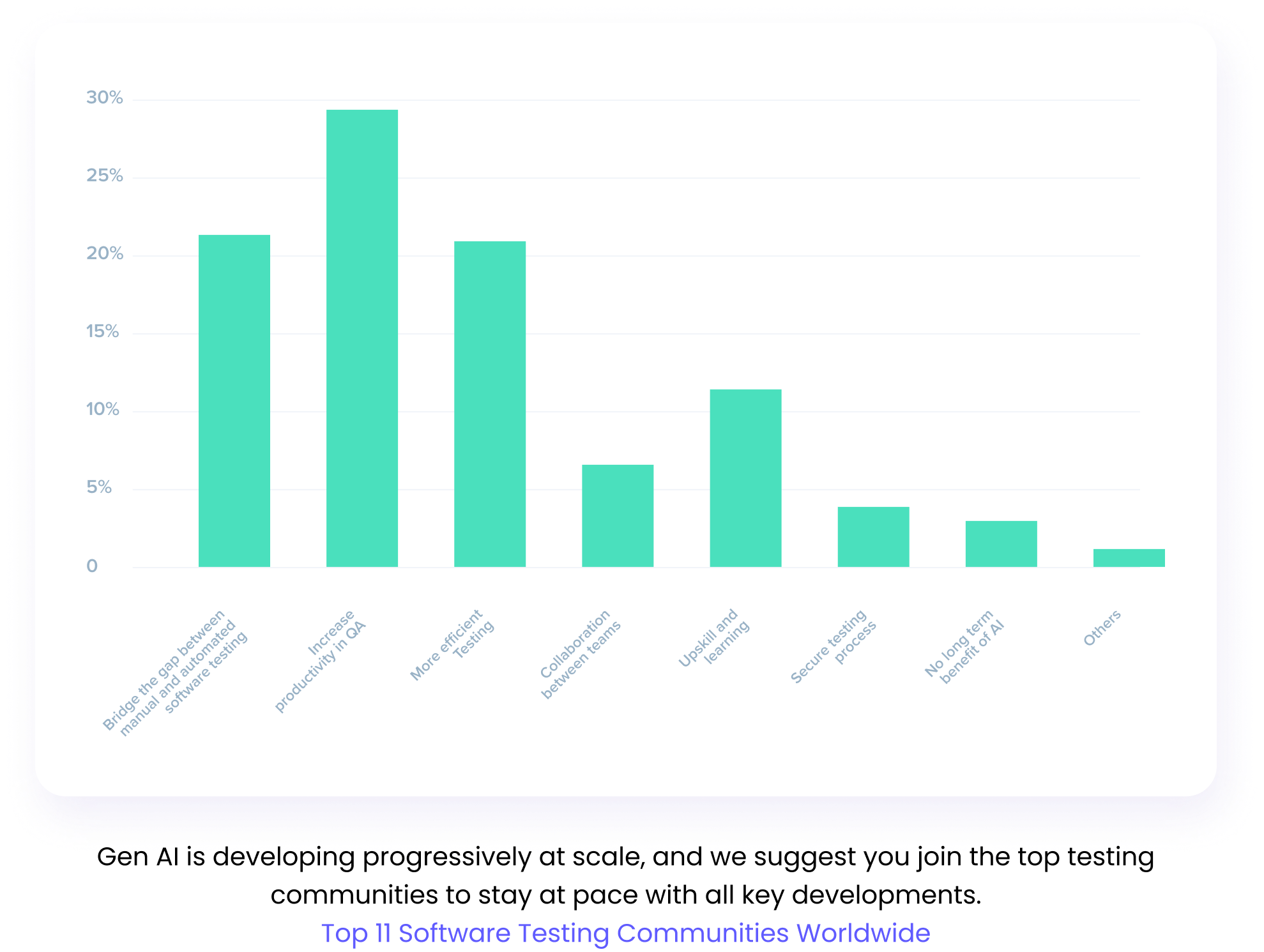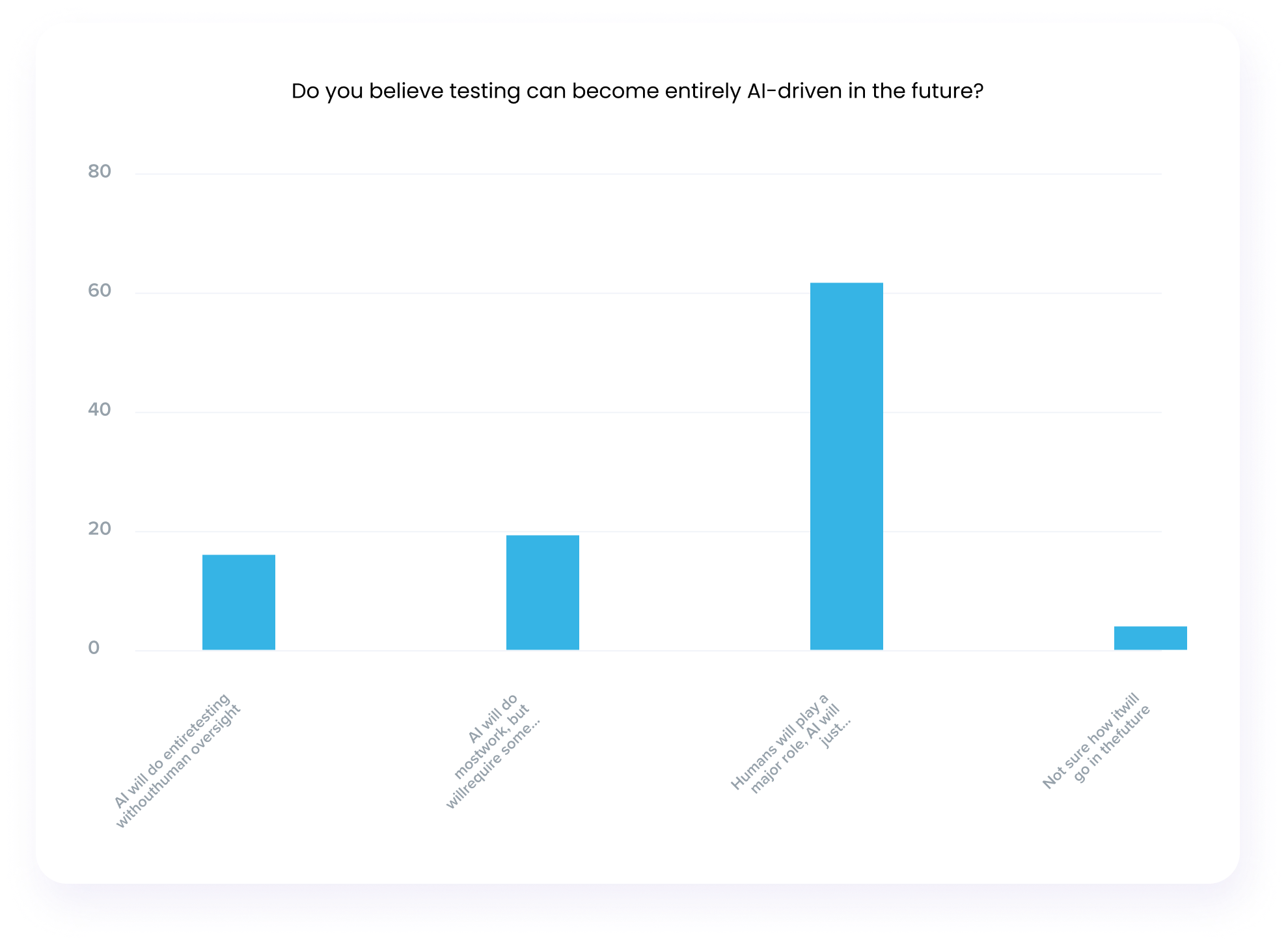Table of Contents
Introduction > The Rising Impact of Gen AI in Test Automation > Key Applications of Gen AI in Test Automation > Self-Healing Test Automation > AI-Powered Defect Prediction & Root Cause Analysis > Automated Test Data Generation > Natural Language Processing (NLP) for Test Automation > AI-Driven Exploratory Testing > Why Gen AI: Optimizing QA Efficiency and Advancing Test Automation Maturity > The Need for Smarter Test Prioritization > The Future of AI-Powered Test Automation > Conclusion > Key Benefits of Avo Assure >Introduction
The emergence of Generative AI (Gen AI) is revolutionizing test automation, transforming it from a rule-based, reactive process into an intelligent, adaptive system. As enterprises increasingly integrate AI into their software development lifecycles, the role of Gen AI in test automation has expanded beyond mere test script generation to advanced applications such as self-healing test suites, defect prediction, and intelligent test scenario generation. This blog explores the key applications of Gen AI in test automation, supported by data, trends, and best practices to help organizations embrace this shift effectively.
The Rising Impact of Gen AI in Test Automation
According to a 2024 Gartner report, AI-powered test automation will drive a 35% increase in test coverage while reducing manual effort by 40% by 2026. A study by Capgemini highlights that 78% of organizations that have integrated AI into their testing processes report faster time-to-market and enhanced software quality. The adoption of Gen AI in testing is driven by the need to accelerate software delivery cycles while ensuring high-quality releases in complex environments.
Related Reading:
Beyond the Hype: Can Generative AI Revolutionize Test Automation?
Key Applications of Gen AI in Test Automation
Intelligent Test Case Generation
Gen AI-powered tools analyze application requirements, user stories, and past defects to generate highly optimized test cases. Instead of relying on predefined templates, AI-driven models can:
- Generate context-aware test cases tailored to real-world scenarios.
- Identify high-risk areas based on past failure patterns.
- Optimize test coverage, ensuring both functional and non-functional aspects are adequately tested.

Industry Insight
Self-Healing Test Automation
Flaky tests and maintenance overhead remain key challenges in automation. Gen AI enables self-healing test automation by dynamically adjusting test scripts in response to UI changes or element modifications. This results in:
- 70% reduction in maintenance efforts.
- Improved test stability with AI-driven auto-correction mechanisms.
- Reduced test failures caused by minor application updates.
Example
AI-Powered Defect Prediction & Root Cause Analysis
Gen AI models can analyze historical test execution data, log files, and code changes to predict potential defects before deployment.
- AI-driven defect prediction achieves an 87% accuracy rate, according to a study by MIT CSAIL.
- Machine learning-based anomaly detection can flag high-risk areas, allowing testers to focus their efforts on critical issues.
Real-World Use Case
Automated Test Data Generation
Test data plays a crucial role in achieving comprehensive test coverage. Gen AI can:
- Generate synthetic test data that mimics real-world user behavior.
- Ensure data privacy compliance by generating realistic yet anonymized datasets.
- Reduce manual test data creation efforts by 50%, accelerating testing cycles.
Trend
Natural Language Processing (NLP) for Test Automation
Gen AI models equipped with NLP capabilities allow testers to write test cases using natural language, which AI then translates into executable scripts. This:
- Reduces the learning curve for non-technical testers.
- Enables business users to contribute to test case design.
- Increases test creation speed by up to 5X.
Example
AI-Driven Exploratory Testing
Traditional exploratory testing is manual and time-consuming. Gen AI enhances this process by:
- Automatically exploring application workflows and identifying weak points.
- Generating test scenarios based on real-user behavior analytics.
- Uncovering hidden vulnerabilities that conventional tests often miss.
Key Statistic
AI-assisted exploratory testing increases defect discovery rates by 42%, according to a study by Deloitte.
"Generative AI enables smarter, self-healing tests, adapting to changes and reducing the maintenance burden, paving the way for more resilient automation."
Source:ACL Digital
Why Gen AI: Optimizing QA Efficiency and Advancing Test Automation Maturity
Maximizing QA Bandwidth with the Right Tooling
According to Future of Quality Assurance Survey, Enterprise QA teams allocate 10.4% of their time to setting up and maintaining test environments, while an additional 7.8% is spent resolving flaky tests. These inefficiencies highlight a critical need for smarter automation and robust tooling to enhance productivity and minimize wasted effort.
Shifting Towards a Quality-First Culture
A promising 71.5% of organizations now include testers in sprint planning, reinforcing a strong commitment to quality-driven development. However, smaller organizations lag behind, with only 61.6% consistently integrating testers in every sprint—an opportunity to strengthen testing culture and early defect detection.
CI/CD Adoption: The Gap Between Automation and Execution
While 89.1% of teams leverage CI/CD tools to accelerate release cycles, a significant 45% still trigger automated tests manually, missing out on the full potential of CI/CD-driven test automation. Fully integrating testing into CI/CD workflows remains a key growth area for optimizing software delivery.
The Need for Smarter Test Prioritization
With 73.8% of teams executing all automated tests in every cycle, the lack of strategic test orchestration is leading to longer feedback loops and inefficient resource utilization. Organizations need intelligent test prioritization mechanisms that account for risk levels, historical defects, and customer impact to ensure optimal efficiency.
Bridging the Test Intelligence and Analytics Gap
Despite the increasing emphasis on data-driven decision-making, 28.7% of organizations lack a dedicated test intelligence infrastructure, and 19.16% operate without even basic structured reporting systems. This underscores a pressing need to adopt advanced observability, analytics, and real-time reporting solutions for enhanced test visibility and decision-making.
The adoption of AI in testing is on the rise, with 77.7% of organizations already integrating or planning to implement AI-powered solutions. Key AI applications include test data generation (50.6%), test log analysis (35.7%), and test case formulation (46%). However, 60.3% of organizations cite reliability concerns, and 54.4% face skill gaps, emphasizing the need for better AI governance and upskilling strategies to unlock AI’s full potential in test automation.
By addressing these challenges with the right tooling, structured automation strategies, and AI-driven intelligence, enterprises can unlock unprecedented efficiency, accelerate release cycles, and enhance software quality at scale.
Why Gen AI: Optimizing QA Efficiency and Advancing Test Automation Maturity
The Need for Smarter Test Prioritization
- Start Small, Scale Gradually: Begin with AI-driven test case generation or self-healing automation before moving to more complex AI applications.
- Ensure Quality Training Data: The effectiveness of Gen AI depends on high-quality, unbiased training data derived from diverse test cases and defect logs.
- Combine AI with Human Expertise: AI enhances, but does not replace, human judgment in testing. Leverage AI for augmentation, not complete automation.
- Integrate AI into CI/CD Pipelines: Embedding AI-driven testing into DevOps workflows ensures seamless, real-time quality control.
- Monitor AI Decisions & Biases: Implement explainable AI (XAI) to ensure transparency and reliability in AI-driven testing outcomes.

.png)
The Future of AI-Powered Test Automation
The global AI in software testing market is projected to reach $1.4 billion by 2026, growing at a CAGR of 23.5%, according to MarketsandMarkets. With advancements in large language models (LLMs), autonomous testing agents, and AI-driven test orchestration, the future of software testing is poised to be more intelligent, adaptive, and resilient than ever before.

Source: Future of Quality Assurance Survey
Conclusion
Gen AI is reshaping test automation by uncovering hidden vulnerabilities, crafting precise test scenarios, and reducing manual testing efforts. From intelligent test generation and defect prediction to NLP-driven automation, AI is making testing smarter, faster, and more efficient. By adopting AI-powered testing strategies, organizations can accelerate software delivery cycles while maintaining top-tier quality standards. Now is the time to rethink test automation and embrace AI-driven innovation for a future-proof testing strategy.
Harness the power of Gen AI in Avo Assure
While the potential of Gen AI in test automation is undeniable, choosing the right tool is critical. We are striving continuously to imbibe Gen AI applications in our Avo Assure platform. We look to become the pioneers of no code test automation built to harness the power of AI while providing unparalleled ease of use and scalability.
Automated QA Testing: Best Practices to Enhance Software Quality
Key Benefits of Avo Assure
- No-Code Testing: Avo Assure enables 100% no-code test automation, making it accessible for teams without technical expertise.
- GenAI Integration: With AI Testcase Generation and Smart Regression Testing, Avo Assure brings Gen AI’s capabilities to life, optimizing testing cycles and minimizing human intervention.
- In-Built Access Management: Ensures secure and compliant workflows, critical for industries like finance and healthcare.
- Seamless Integration: Avo Assure integrates effortlessly with enterprise systems like SAP, Oracle Fusion, and test management platforms.
- Scalable and Reliable: Designed to handle complex, large-scale testing processes, Avo Assure ensures high performance even in demanding environments.
Ready to revolutionize your test automation?
Schedule a demo now to learn more about Avo Assure and start your journey toward intelligent automation today.




